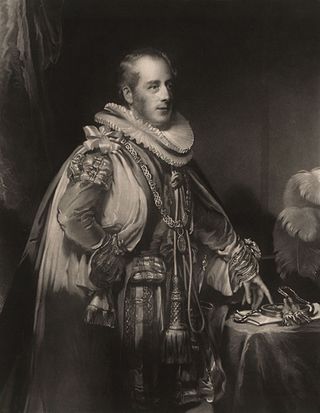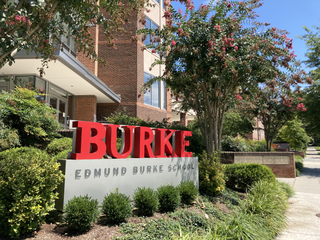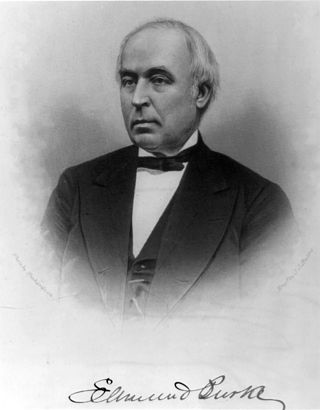
Edmund Burke was an Anglo-Irish statesman and philosopher who spent most of his career in Great Britain. Born in Dublin, Burke served as a member of Parliament (MP) between 1766 and 1794 in the House of Commons of Great Britain with the Whig Party.

Sir Charles Bagot, was a British politician, diplomat and colonial administrator. He served as ambassador to the United States, Russia, and the Netherlands. He served as the second Governor General of the Province of Canada from 1841 to 1843.
Burke is a surname or given name.

Edmund Burke School is an independent college preparatory school in Washington, D.C. Located on Connecticut Avenue NW, two blocks from the Van Ness - UDC metro station, Burke enrolls approximately 315 students in Grades 6–12.

Frederick Paul Fromm is a Canadian former high school teacher, white supremacist, neo-Nazi, and perennial political candidate.

Reflections on the Revolution in France is a political pamphlet written by the British statesman Edmund Burke and published in November 1790. It is fundamentally a contrast of the French Revolution to that time with the unwritten British Constitution and, to a significant degree, an argument with British supporters and interpreters of the events in France. One of the best-known intellectual attacks against the French Revolution, Reflections is a defining tract of modern conservatism as well as an important contribution to international theory. The Norton Anthology of English Literature describes Reflections as becoming the "most eloquent statement of British conservatism favoring monarchy, aristocracy, property, hereditary succession, and the wisdom of the ages." Above all else, it has been one of the defining efforts of Edmund Burke's transformation of "traditionalism into a self-conscious and fully conceived political philosophy of conservatism".
Edmund Burke (1851–1919) was a highly regarded Canadian architect best known for building Toronto's Prince Edward Viaduct or "Bloor Street Viaduct", and Toronto's Robert Simpson store. He served as the vice-president, then President of the Ontario Association of Architects.

A Vindication of Natural Society: or, a View of the Miseries and Evils arising to Mankind from every Species of Artificial Society is a work by Edmund Burke published in 1756. It is a satire of Lord Bolingbroke's deism. Burke confronted Bolingbroke not in the sphere of religion but civil society and government, arguing that his arguments against revealed religion could apply to all institutions. So close to Bolingbroke's style was the work, that Burke's ironic intention was missed by some readers, leading Burke in his preface to the second edition (1757) to make plain that it was a satire. Nonetheless, this work was considered by William Godwin to be the first literary expression of philosophical anarchism.
Alan Overfield was born a First Nations person on Manitoulin Island and is considered to have been a Canadian white supremacist.
Events from the year 1802 in Ireland.

Edmund Burke was an American lawyer, newspaper editor and politician. He served as the United States Commissioner of Patents and as a U.S. Representative from New Hampshire in the 1840s.
Edmund Burke (1729–1797) was an Irish statesman, political theorist, and philosopher.
Traditionalist conservatism, often known as classical conservatism, is a political and social philosophy that emphasizes the importance of transcendent moral principles, manifested through certain posited natural laws to which it is claimed society should adhere. It is one of many different forms of conservatism. Traditionalist conservatism, as known today, is based on Edmund Burke's political views as well as the views of Joseph de Maistre. Traditionalists value social ties and the preservation of ancestral institutions above what they perceive as excessive individualism. One of the first uses of the phrase "conservatism" began around 1818 with a monarchist newspaper named "Le Conservateur", written by Francois Rene de Chateaubriand with the help of Louis de Bonald.
Peter James Marshall is a British historian known for his work on the British Empire, particularly the activities of British East India Company servants in 18th-century Bengal, and also the history of British involvement in North America during the same period. He is not to be confused with his contemporary, the other P. J. Marshall, who chronicled the history of public transport in the British Isles.

Brendan Gilmore Burke was an athlete and student manager at Miami University for the RedHawks men's ice hockey team. The youngest son of Brian Burke, former general manager of the Toronto Maple Leafs, longtime executive of various other NHL teams and of the US Olympic hockey team, in November 2009, he made international headlines for coming out, advocating for tolerance and speaking out against homophobia in professional sports. Burke's coming out was widely praised and supported by sports news outlets and fans, generating multiple discussions about homophobia in sports, and in hockey in particular. He was viewed as a pioneer in advocacy against homophobia in hockey, described as "the closest person to the NHL ever to come out publicly and say that he is gay."

Henry Langley was a Canadian architect based in Toronto. He was active from 1854 to 1907. Among the first architects born and trained in Canada, he was a founding members of the Royal Canadian Academy of Arts in 1880 and was instrumental in establishing the Ontario Association of Architects in 1889. A conservative in architectural design, he is primarily known for designing numerous churches in the Toronto area, although he designed many secular buildings as well including residential, commercial and public buildings. Langley designed 70 churches throughout Ontario. He was the first chair of the Department of Architecture at the University of Toronto, where he taught during the 1880s and 1890s.

Edmund Burke is a bronze, full-length statue of British statesman, author, orator, political theorist, and philosopher Edmund Burke by British artist James Havard Thomas. The original statue is in Bristol, England, with a second cast in Washington, D.C. The statue in Washington, D.C., stands in Burke Park, at the intersection of 11th Street, L Street, and Massachusetts Avenue NW, on the southern border of the Shaw neighborhood. The statue was a gift from the Charles Wakefield, 1st Viscount Wakefield, on behalf of the Sulgrave Institution, an organization that wanted to celebrate United Kingdom–United States relations. One way the group did this was by exchanging statues and busts between the two countries.
The philosophy of human rights attempts to examine the underlying basis of the concept of human rights and critically looks at its content and justification. Several theoretical approaches have been advanced to explain how and why the concept of human rights developed.

The religious thought of Edmund Burke includes published works by Edmund Burke and commentary on the same. Burke's religious thought was grounded in his belief that religion is the foundation of civil society. He sharply criticized deism and atheism and emphasized Christianity as a vehicle of social progress. Born in Ireland to a Protestant father and Catholic mother, Burke vigorously defended the Church of England, but also demonstrated sensitivity to Catholic concerns. He linked the conservation of a state religion with the preservation of citizens’ constitutional liberties and highlighted Christianity’s benefits not only to the believer’s soul but also to political arrangements.

Burke Brook is a small stream in Toronto, Ontario. It is part of the Don River watershield, a major river that flows into Lake Ontario. The north end of the stream begins near Glenview Senior Public School.











